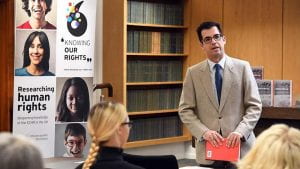Brand new in 2019 at Goldsmiths is our Law LLB programme. Dimitrios Giannoulopoulos, Professor of Law, reveals all on how this course fits in with our excellence in creative arts, humanities and social sciences.
Hi there! Could you tell us a little bit about yourself and your background?
 I come from Greece, as you can probably tell by my name and surname (I often challenge my students to spell them correctly, for extra credit!). I received my undergraduate legal education in Athens, before pursuing postgraduate studies in France and the UK, and undertaking legal research in the United States. Before joining Goldsmiths last May, I was an Associate Dean at Brunel University London, and the Deputy Head of the Law School there before that. My research focuses on the interaction between criminal law and human rights.
I come from Greece, as you can probably tell by my name and surname (I often challenge my students to spell them correctly, for extra credit!). I received my undergraduate legal education in Athens, before pursuing postgraduate studies in France and the UK, and undertaking legal research in the United States. Before joining Goldsmiths last May, I was an Associate Dean at Brunel University London, and the Deputy Head of the Law School there before that. My research focuses on the interaction between criminal law and human rights.
Please can you give us a quick overview of the degree course?
Our LLB Law programme is a qualifying law degree, which has been developed in anticipation of the new Solicitors Qualifying Examination. The programme gives students access to all the fundamentals (Contract Law, Trusts, Public Law, Criminal Law etc), equips them with the professional knowledge and skills required to practice law in corporate firms, but also gives them access to timely and innovative subjects such as Artificial Intelligence and Law, Immigration Law, Intellectual Property, Art Law, Law and Psychology, Media and Law, which will allow students to pursue exciting, alternative, careers.
The degree also places a heavy emphasis on student experience and professional development. Learning outside the classroom, through visits to the Royal Courts, the Old Bailey or the Supreme Court, for instance, or through professional awareness seminars in the City for the more commercially minded, is not left to chance but is rather an integral part of the teaching in each module.
What makes the Goldsmiths course distinctive?
The interdisciplinary and contextual approach that we take is distinctive. We do not teach law in isolation of the world around us, but rather within its institutional, socio-political, economic and cultural context. Our students will critically engage with core debates and interrogate existing structures. They will be able to extend their knowledge beyond the traditional boundaries of the legal discipline by engaging with sociological, psychological and anthropological perspectives.
In addition to integrating content specific to the new Solicitors Qualifying Examination, we have a close working relationship with the Inns of Court and leading chambers, and can offer our students insight into what it takes to become a barrister as well as opportunities that will enable them to take this route.
 What are you looking for in an applicant? Do you have any tips for a great personal statement?
What are you looking for in an applicant? Do you have any tips for a great personal statement?
Demonstrating a passion for learning, communicating, and engaging with others will take candidates a long way. What have they done that shows they’re ready to go the extra mile and undertake an intellectually challenging degree that they can use as a great foundation for whatever they decide to do later on in life? The ability to express themselves clearly and concisely, follow a logical structure, and showcase different aspects of their knowledge and personality, is also of the essence.
How does this degree support students practically for life after university?
The law programme at Goldsmiths has a focus on an eclectic educational provision and sector leading professional development initiatives. Debating, mooting, mock trials, mock contract negotiations, law film screenings, examining law through literature, participating in dispute resolution clinics, teaching on advocacy and client interviewing, conceiving law in action through relevant VR experiences, and a law clinic on human rights are integral to the degree and the wider experience of studying law here. We also equip our students with the digital understanding required from 21st century lawyers. We teach them modern legal skills, including how lawyers are beginning to use AI for case preparation and analysis.
And finally…tell us a joke!
Oh, my jokes often come from personal experiences (I won’t say if they’re embarrassing) and I will often share them in the most unexpected moment in the classroom. I couldn’t possibly share one of these stories here, but look forward to the opportunity to doing so with some of your students in the near future.
To find out more about our LLB Law programme, visit gold.ac.uk/law or book onto one of our Law Information Evenings.